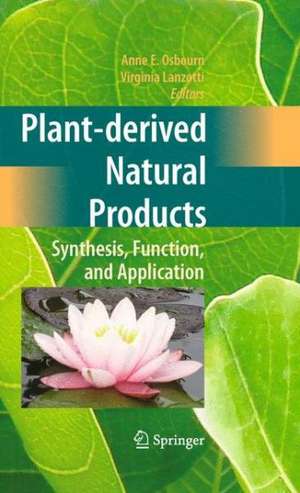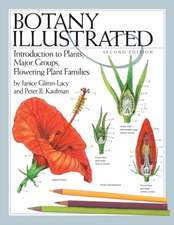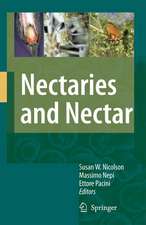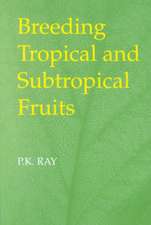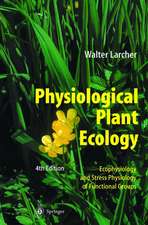Plant-derived Natural Products: Synthesis, Function, and Application
Editat de Anne E. Osbourn, Virginia Lanzottien Limba Engleză Hardback – 27 iul 2009
Plant-derived natural products: synthesis, function and application provides an informative and accessible overview of the different facets of the field, ranging from an introduction to the different classes of natural products through developments in natural product chemistry and biology to ecological interactions and the significance of plant-derived natural products for humans. In the final section of the book a series of chapters on new trends covers metabolic engineering, genome-wide approaches, the metabolic consequences of genetic modification, developments in traditional medicines and nutraceuticals, natural products as leads for drug discovery and novel non-food crops.
| Toate formatele și edițiile | Preț | Express |
|---|---|---|
| Paperback (1) | 1206.65 lei 6-8 săpt. | |
| Springer – 15 sep 2014 | 1206.65 lei 6-8 săpt. | |
| Hardback (1) | 1081.43 lei 39-44 zile | |
| Springer – 27 iul 2009 | 1081.43 lei 39-44 zile |
Preț: 1081.43 lei
Preț vechi: 1422.93 lei
-24% Nou
Puncte Express: 1622
Preț estimativ în valută:
207.03€ • 215.20$ • 171.65£
207.03€ • 215.20$ • 171.65£
Carte tipărită la comandă
Livrare economică 03-08 februarie 25
Preluare comenzi: 021 569.72.76
Specificații
ISBN-13: 9780387854977
ISBN-10: 0387854975
Pagini: 597
Ilustrații: XIV, 597 p.
Dimensiuni: 155 x 235 x 43 mm
Greutate: 1.18 kg
Ediția:2009
Editura: Springer
Colecția Springer
Locul publicării:New York, NY, United States
ISBN-10: 0387854975
Pagini: 597
Ilustrații: XIV, 597 p.
Dimensiuni: 155 x 235 x 43 mm
Greutate: 1.18 kg
Ediția:2009
Editura: Springer
Colecția Springer
Locul publicării:New York, NY, United States
Public țintă
ResearchCuprins
The chemical composition of plants.- to the Different Classes of Natural Products.- Natural Products from Seaweeds.- Use of Secondary Metabolite Variation in Crop Improvement.- Approaches to the Analysis of Plant-Derived Natural Products.- Opportunities and Challenges for Ethnobotany at the Start of the Twenty-First Century.- Secondary metabolite biosynthesis.- to the Different Classes of Biosynthetic Enzymes.- Methods for Molecular Identification of Biosynthetic Enzymes in Plants.- Regulation of Secondary Metabolism by Jasmonate Hormones.- Metabolite Channeling and Multi-enzyme Complexes.- Glycosylation of Secondary Metabolites and Xenobiotics.- Handling Dangerous Molecules: Transport and Compartmentation of Plant Natural Products.- Participation of Phytochemicals in Plant Development and Growth.- Biological activity.- Biological Activity of Defence-Related Plant Secondary Metabolites.- The Role of Natural Products in Plant-Microbe Interactions.- Role of Natural Products in Nature: Plant-Insect Interactions.- Oligosaccharide Signalling Molecules.- Biological Activity of Allelochemicals.- Health Benefits of Dietary Plant Natural Products.- Floral Scents and Fruit Aromas Inspired by Nature.- New trends.- Bioengineering.- Genome Wide Approaches in Natural Product Research.- Metabolomics and the Detection of Unintended Effects in Genetically Modified Crops.- Recent Advances in Traditional Medicines and Dietary Supplements.- Plant-derived natural products as leads for drug discovery.- Speciality Non-food Crops.
Recenzii
From the reviews:“This compilation of 25 review articles begins with a comprehensive introduction to the structures, biological activities, and applications of the major classes of terrestrial and marine plant-derived natural products. … the book as a whole would have more utility to professionals wishing to increase their general knowledge of these topics. All of the articles are written articulately, and … with an extensive bibliography for those who wish to consult the primary literature. Summing Up: Recommended. Upper-division undergraduates, graduate students, and professionals.” (D. L. Jacobs, Choice, Vol. 47 (7), March, 2010)
Notă biografică
Professor Anne Osbourn is Head of the Department of Metabolic Biology at the John Innes Centre, Norwich, UK, where she runs a research programme on plant-derived natural products. Her research is focused on the synthesis and function of plant-derived natural products and on mechanisms underpinning metabolic diversification.
Professor Virginia Lanzotti is associate professor of organic chemistry at University of Molise, Campobasso, Italy and Meetings Secretary of the Phytochemical Society of Europe (PSE). Her research is focused on the stereostructure of natural products, drug discovery, food chemistry, and soil organic matter phytotoxicity. Winner of the 2003 PSE-Pierre Fabre award for excellence in phytochemistry.
Professor Virginia Lanzotti is associate professor of organic chemistry at University of Molise, Campobasso, Italy and Meetings Secretary of the Phytochemical Society of Europe (PSE). Her research is focused on the stereostructure of natural products, drug discovery, food chemistry, and soil organic matter phytotoxicity. Winner of the 2003 PSE-Pierre Fabre award for excellence in phytochemistry.
Textul de pe ultima copertă
Plant-derived natural products: Synthesis, function and application
Plants produce a huge array of natural products (secondary metabolites). These compounds have important ecological functions, providing protection against attack by herbivores and microbes and serving as attractants for pollinators and seed-dispersing agents. They may also contribute to competition and invasiveness by suppressing the growth of neighbouring plant species (a phenomenon known as allelopathy). Humans exploit natural products as sources of drugs, flavouring agents, fragrances and for a wide range of other applications. Rapid progress has been made in recent years in understanding natural product synthesis, regulation and function and the evolution of metabolic diversity. It is timely to bring this information together with contemporary advances in chemistry, plant biology, ecology, agronomy and human health to provide a comprehensive guide to plant-derived natural products.
Plant-derived natural products: synthesis, function and application provides an informative and accessible overview of the different facets of the field, ranging from an introduction to the different classes of natural products through developments in natural product chemistry and biology to ecological interactions and the significance of plant-derived natural products for humans. In the final section of the book a series of chapters on new trends covers metabolic engineering, genome-wide approaches, the metabolic consequences of genetic modification, developments in traditional medicines and nutraceuticals, natural products as leads for drug discovery and novel non-food crops.
Professor Anne Osbourn is Head of the Department of Metabolic Biology at the John Innes Centre, Norwich, UK, where she runs a research programme on plant-derived natural products. Her research is focused on the synthesis and function of plant-derived natural products and on mechanisms underpinning metabolic diversification.
Professor Virginia Lanzotti is associate professor of organic chemistry at University of Molise, Campobasso, Italy and Meetings Secretary of the Phytochemical Society of Europe (PSE). Her research is focused on the stereostructure of natural products, drug discovery, food chemistry, and soil organic matter phytotoxicity. Winner of the 2003 PSE-Pierre Fabre award for excellence in phytochemistry.
Plants produce a huge array of natural products (secondary metabolites). These compounds have important ecological functions, providing protection against attack by herbivores and microbes and serving as attractants for pollinators and seed-dispersing agents. They may also contribute to competition and invasiveness by suppressing the growth of neighbouring plant species (a phenomenon known as allelopathy). Humans exploit natural products as sources of drugs, flavouring agents, fragrances and for a wide range of other applications. Rapid progress has been made in recent years in understanding natural product synthesis, regulation and function and the evolution of metabolic diversity. It is timely to bring this information together with contemporary advances in chemistry, plant biology, ecology, agronomy and human health to provide a comprehensive guide to plant-derived natural products.
Plant-derived natural products: synthesis, function and application provides an informative and accessible overview of the different facets of the field, ranging from an introduction to the different classes of natural products through developments in natural product chemistry and biology to ecological interactions and the significance of plant-derived natural products for humans. In the final section of the book a series of chapters on new trends covers metabolic engineering, genome-wide approaches, the metabolic consequences of genetic modification, developments in traditional medicines and nutraceuticals, natural products as leads for drug discovery and novel non-food crops.
Professor Anne Osbourn is Head of the Department of Metabolic Biology at the John Innes Centre, Norwich, UK, where she runs a research programme on plant-derived natural products. Her research is focused on the synthesis and function of plant-derived natural products and on mechanisms underpinning metabolic diversification.
Professor Virginia Lanzotti is associate professor of organic chemistry at University of Molise, Campobasso, Italy and Meetings Secretary of the Phytochemical Society of Europe (PSE). Her research is focused on the stereostructure of natural products, drug discovery, food chemistry, and soil organic matter phytotoxicity. Winner of the 2003 PSE-Pierre Fabre award for excellence in phytochemistry.
Caracteristici
The co-editors Anne Osbourn (a plant and microbial biologist) and Virginia Lanzotti (a natural product chemist) are both established leaders in their fields with very strong track records in the area of natural product research. Here their complementary backgrounds are brought together, providing strengths across the disciplines and making the book a true interdisciplinary project. The book gives comprehensive coverage of all key aspects of plant-derived natural products, from distribution and analysis through synthesis, function and application to traditional medicines, nutraceuticals and novel non-food crops. Each chapter is written in an informative but accessible way to give good succinct coverage of the area without going into unnecessary detail.
